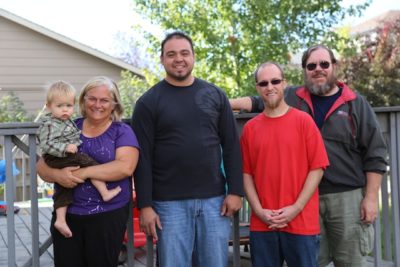
The Bible says every man has distinct groups of people around him. It describes who these people are and what our relationships with them should look like when we walk in obedience to Jesus Christ.
In this post I will first describe these groups and then I’ll look at two key biblical passages that define them.
I like to call these groups of people “circles.” I have written about them in the past. I think of them as concentric: some of these circles describe people who are very close to us while some of them represent people who are more distant from us.
Unless we live alone on an island in the South Pacific, at least one or more of these circles of people are always around us.
The innermost circle, of course, is comprised of our wife and children – our immediate family. The next closest is our extended family: parents, grand parents, nieces and nephews, aunts and uncles, etc.
The next one is even further out and is comprised of the members of our church, the body of Christ.
And finally, the circle that is the furthest away of all is our neighbors. In the narrow sense, this neighbor circle is comprised of people who live near us. But in a more broad and biblical sense, this circle is made up of anyone who is not in the other circles. Anyone in the world can also be our neighbor.
Now it is possible that we may feel closer to people in our more outer circles than we do to people in our more inner circles. We may have friends and neighbors we feel closer to than people at church. Or we may not be married or have children. Often we rarely see our distant relatives, while we see people at church every week.
But the purpose of thinking about the relationships we have with the people around us in terms of these circles is not to describe the depth of these relationships, but to describe the priority of responsibility we have to meet the pressing needs of the people in them. For example, we are going to see that, biblically speaking, people in our inner circles – our family and extended family – take priority over people in our outer circles – our church and neighbors.
I have one more observation about these circles before I discuss the above mentioned biblical passages.
Non-Christians tend to limit their responsibilities to the first two circles: marriage and family, and extended family members – if that.
Christians, on the other hand, have two additional circles of responsibility that distinguish them from non-Christians, and those are fellow believers and neighbors.
Now here are the passages.
“Anyone who does not provide for their relatives, and especially for their own household, has denied the faith and is worse than an unbeliever.” 1 Timothy 5:8 (NIV)
“Therefore, as we have opportunity, let us do good to all people, especially to those who belong to the family of believers.” Galatians 6:10 (NIV)
In 1 Timothy 5:8, we see one of the most severe sanctions in Scripture. Someone who does not provide for their family and extended family is guilty of apostasy. Note here that Paul is describing two categories – two “circles,” if you will – and gives priority to family: “especially for their own household.”
Even unbelievers, in general, provide for their family and extended family. So what really distinguishes believers from unbelievers is our responsibility towards the two groups described in Galatians 6:10.
Here Paul is again enumerating two separate groups – two more “circles” around us. These two groups are “all people” in general” and “the family of believers,” and in the process he gives priority to fellow believers. We are to do good to all, especially to Christians.
There you have it, four circles: family, extended family, fellow believers, and neighbors (all people).
So, how are the people in your four circles? Is there anyone you know in them who needs your special attention today? If so, it’s time to get to work.
This post first appeared in NewCommandment.org.

Since 2003 New Commandment Men’s Ministries has helped hundreds of churches throughout North American and around the world recruit teams of men who permanently adopt their widowed and single parents in their congregations for the purpose of donating two hours of service to them one Saturday morning each month. We accomplish this with a free training site called New Commandment Men’s Ministry
Learn how to mobilize your men’s ministry to meet every pressing need in your church here.
_______________________________________________________________

Learn how to form teams of men for every widow, single mom
and fatherless child in your church at NewCommandment.org.
_______________________________________________________________